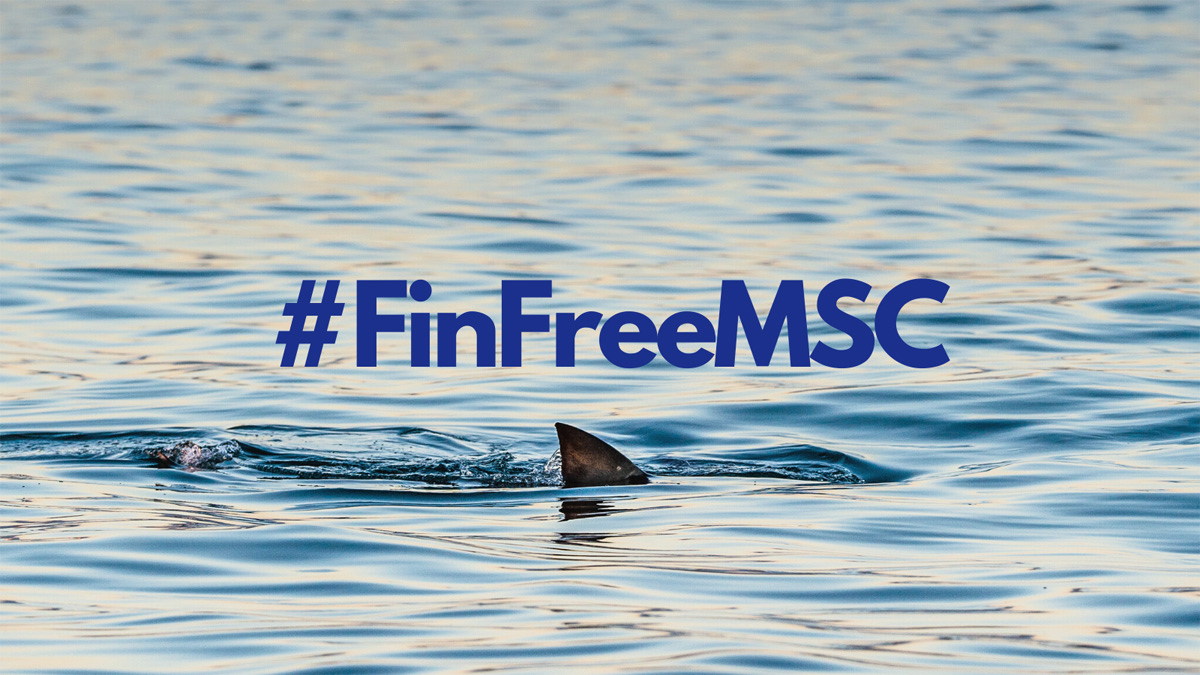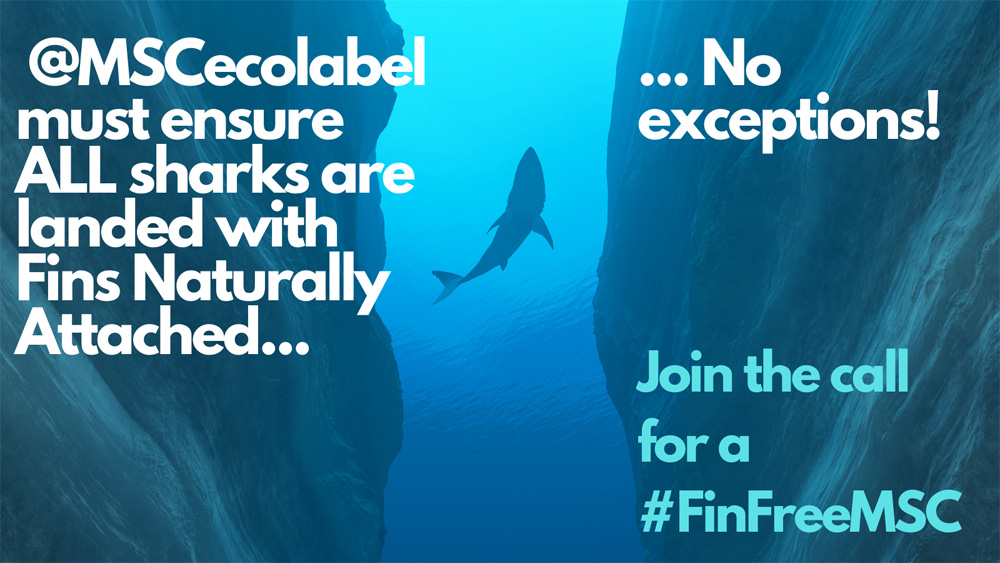Marine Life & Conservation
Calls for Marine Stewardship Council to raise bar on shark finning

A recent report criticises the Marine Stewardship Council (MSC) for failing in its stated ‘zero tolerance’ approach to shark finning and calls for urgent reform.
Shark populations globally are on the brink of collapse under fishing pressure: an estimated 63—273 million sharks are killed each year and numbers of oceanic sharks have dropped by 71% since 1970. A major driver of this unsustainable exploitation is the existence of a lucrative global shark fin trade. Shark finning is illegal across many jurisdictions but bans vary in their effectiveness and enforcement and the practice continues across the ocean, including in MSC-certified fisheries.
This report analyses existing approaches used to enact finning bans, concluding that it is now well-established that the most effective means of banning shark finning is by requiring that all sharks must be landed with Fins Naturally Attached (FNA). Dr. Iris Ziegler of Sharkproject International said:
“Shark finning is a practice which, by its nature, takes place under the radar. The incidences we are aware of may be just the tip of the iceberg. It is absolutely crucial that fisheries require Fins Naturally Attached. This is the only effective means of eliminating shark finning as it closes loopholes and provides the strongest possible foundation for detecting incidences and removing bad actors from fisheries: if monitoring detects fins on board, it is immediately clear that a breach has taken place and sanctions can be imposed.”
An FNA policy is in place in 19 of the world’s 43 foremost shark fishing nations, and is a requirement in jurisdictions including the United Kingdom, United States, European Union, Canada, Costa Rica, South Africa and Brazil. In contrast, this report criticises the MSC, one of the world’s leading seafood sustainability eco-labelling schemes, for failing to fully implement the ban on shark finning it had announced in 2011. The authors are also concerned that MSC has failed to implement a Fins Naturally Attached policy for all certified fisheries that interact with sharks, despite clear global sustainability trends and multiple calls from stakeholders in the decade since the announcement.
Susan Millward, Marine Program Director, Animal Welfare Institute said:
“Fins Naturally Attached is no longer merely ‘best practice’ but increasingly a bare minimum expectation for sustainable fisheries management. It is truly shocking that instead of taking the lead and driving global action against shark finning, the Marine Stewardship Council instead lags more than a decade behind the cutting-edge. MSC may claim to have ‘zero tolerance’ towards shark finning but this rhetoric is not yet matched by its requirements.”
As the MSC continues its five-yearly Fisheries Standard Review with the publication of a potentially revised Standard scheduled for next year, this report concludes by providing recommended actions. The report strongly urges MSC to revise its Standard such that:
• Evidence of shark finning must preclude a fishery upfront from entering the MSC certification process.
• Any fishery interacting with sharks must, as a prerequisite, have a Fins Naturally Attached policy with no exemptions in place at the time of certification.
• Based on objectively verifiable criteria, the risk of finning occurring needs to be assessed and the extent of monitoring and surveillance required for that fishery should be defined according to risk categories (low, medium, high)
Katie Woodroffe of Shark Guardian said:
“It is time for the MSC to listen to stakeholders and seize the opportunity of the Fisheries Standard Review to raise the bar by requiring Fins Naturally Attached as a prerequisite for certification – with no exemptions! In the face of mass extinction, we need to be doing everything in our power to stamp out the horrific practice of shark finning. Fleets around the world have successfully implemented Fins Naturally Attached and demonstrated it to be a feasible and effective solution. There is absolutely no reason why fisheries which have been MSC-certified, or which aspire to certification, should not follow suit.”
For more information on the work of Shark Guardian visit their website by clicking here.
Marine Life & Conservation
Go Diving Show 2025 UK Stage Speaker: Lloyd Rees-Jones

Sharks dwell off the UK coastline, but did you know there is one that glows in the dark? Join Lloyd Rees-Jones at this year’s GO Diving Show in March when he takes to the UK Stage to showcase a very different side of our marine life when viewed in a different light (no pun intended!).
Lloyd Rees-Jones is a HSE Part 4 Media Diver, PADI Master Scuba Diver Trainer, underwater videographer and seasoned volunteer with Neptunes Army of Rubbish Cleaners (NARC). For almost 20 years he has been completely captivated by three shore diving locations in Pembrokeshire, West Wales, and every year he discovers something new that fills him with excitement for the season ahead and keeps him going back year after year.
Ultraviolet night diving in Pembrokeshire
Lloyd’s talk on the UK Stage will be about marine fluorescence and the nocturnal activities of our favourite coastal species, and will give a glimpse on how ultraviolet night diving has the potential to rekindle our passion for night diving – and also the hidden benefits it can bring to our UK diving adventures.
Go Diving Show 2025 takes place at the NAEC Stoneleigh Park, Coventry, on the 1st -2nd March.
Marine Life & Conservation
Go Diving Show 2025 UK Stage Speaker: Roisin Maddison

Underwater photogapher and avid UK diver Roisin Maddison will be taking to the UK Stage at the GO Diving Show in March to discuss why she loves diving off our coastline.
Roisin will be talking about her passion for our native species, UK diving and why it isn’t just deep, dark and cold.
Go Diving Show 2025 takes place at the NAEC Stoneleigh Park, Coventry, on the 1st -2nd March.
-

 Gear Reviews2 months ago
Gear Reviews2 months agoGear Review: SurfEars 4
-

 Marine Life & Conservation2 months ago
Marine Life & Conservation2 months agoPaul Watson Released as Denmark Blocks Japan’s Extradition Bid
-

 Blogs3 months ago
Blogs3 months agoExperience Malta and Gozo in 2025: A Paradise for Divers and Culture Lovers
-

 Blogs3 months ago
Blogs3 months agoJeff Goodman Launches Underwater Moviemaker Course with NovoScuba
-

 News3 months ago
News3 months agoDive into Adventure: Limited Space Available for January Socorro Liveaboard Trip with Oyster Diving
-

 News5 days ago
News5 days agoHumpback Mother and Calf Win Underwater Photographer of the Year 2025
-

 News1 month ago
News1 month ago2-for-1 tickets now available for GO Diving Show
-

 News2 weeks ago
News2 weeks agoFilming 360 in The Bahamas














